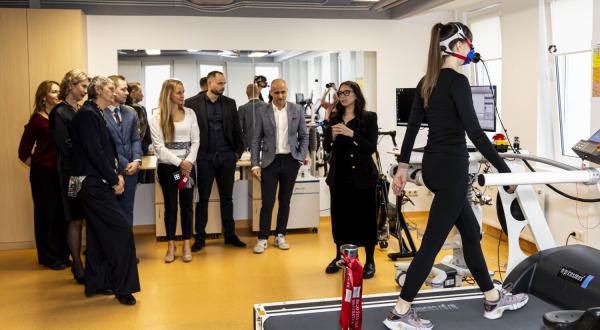RSU part of Baltic group collaborating with European Organization for Nuclear Research (CERN)
Latvian, Estonian and Lithuanian universities have officially established the CERN (European Organization for Nuclear Research) Baltic group, to collaborate with the organisation. On 29 May CERN in Geneva, and major universities in the Baltic States signed a Memorandum of Understanding, which is unique in the history of CERN, as none of the countries in this region has been able to legally combine their efforts to coordinate their cooperation with the world's leading particle physics research, innovation and scientific discovery centre.
Rīga Stradiņš University (RSU) is part of this group, and the aforementioned memorandum, was signed by Head of the Physics Department, Assistant Professor Jevgenijs Proskurins, representing RSU.

Head of RSU Physics Department, Assistant Professor Jevgenijs Proskurins signing the Memorandum of Understanding. Photo from personal archive.
With the signature of the Memorandum of Understanding together with colleagues from other Baltic States, RSU begins official collaboration with CERN which will provide a great opportunity to take part in CERN scientific experiments, as well as high-level scientific research, for example, CERN-Medicis.
CERN Baltic group comprises all major regional universities: Riga Stradiņš University (RSU), Riga Technical University, University of Latvia, Kaunas University of Technology, Vilnius University, Estonian National Institute of Biochemistry, Tallinn University of Technology and University of Tartu.

Head of RSU Physics Department, Assistant Professor Jevgenijs Proskurins (eighth from the left) together with representatives from other universities in the Baltic region.
Lithuania has already acquired the status of CERN Associate Member, but Latvia and Estonia are on their way to it. In order for both countries to become Member States, the Baltic States need to develop high-energy physics research, and therefore the new CERN Baltic Group will develop an international Master and PhD level study programme in Particle Physics and Accelerator Technology to enable Baltic students to acquire the knowledge they will need for cooperation with CERN. This will be an internationally unique interdisciplinary programme that combines basic and applied science - particle physics with accelerator technology. It is anticipated that students will acquire research experience at CERN.
The next CERN Group meeting will be held in September in Tallinn.




